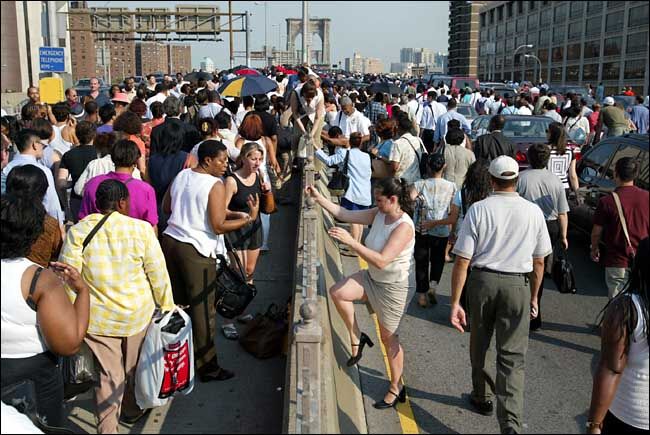Each time I attend a march I am always left feeling a bit empty and wondering what was/will be the tangible impact of that day’s actions. This feeling has increased over the years as the not only the number of causes to march for has increased, but so has the efficiency of these marches.
 Take for example yesterday’s rally in
Take for example yesterday’s rally in
As I made my way to Brooklyn from  many associate with NYC are subsumed by the mundaneness (for a lack of a better word) of most New Yorkers in comfortable shoes, backpacks and t-shirts gathering together trying to prove a point.
many associate with NYC are subsumed by the mundaneness (for a lack of a better word) of most New Yorkers in comfortable shoes, backpacks and t-shirts gathering together trying to prove a point.
However what the blackout proved though, is that it was once the throngs made it back to the outer boroughs that New Yorkers really defined themselves; scores of people held impromptu barbecues so that their food would not go to waste and neighbors, many people who were normally too busy or too introverted to interact with each other were suddenly found sharing food goods and stories on fronts lawns and building roofs. Other than the occasional block party, that was the only day I ever saw the residents on my block barbecuing because on any other given day in New York it would seem absurd for those living in our buildings to gather out front hovering over a grill as if we lived in some suburban enclave.
I wonder if its possible to cultivate a similar form of spontaneity and sense of community after a rally, especially now that rallies and marches have become somewhat uniformed in NYC (and I imagine the same is happening in Chicago/DC and Los Angeles) a way for the momentum to extend to the outer boroughs. I wonder if New Yorkers are capable of being as kind and cordial with our neighbors in large group settings without the banners of a cause or being ushered by police, and whether we are capable of opening ourselves up like we did during the black out.
I ask these questions in the aftermath of the immigration rallies because I do not want to lose the momentum of solidarity. After years of watching immigrants of all different hues ant nationalities being accused of everything from bringing AIDS and other infectious diseases to this country—most notably Haitians and those from Sub-Saharan Africa—to being vilified as terrorists—I think the challenge is less about showing government that immigrants are important to America—but it should be to remind ourselves to never forget that our fellow US residents, regardless of what stationery they have saying that they have a right to be here, have rights that need to be respected. Yes we can speak nostalgically about Irish, Italians and Jewish immigration (quite honestly I find it a bit troubling that people tend to speak of these groups emigrating to the US only in the past tense as if they are not still making their ways to these shores), but American citizens need to become more proactive in calling for economic and security agendas that are set apart from spurious actions/claims by members of a supposed “axis of evil” and “illegal immigrants.”
The throngs of people coming to the shores and across the borders of the US are not arriving like pariahs in the night to steal American babies, jobs and livelihoods—in fact one can make an argument that Americans are more guilty of these actions abroad than immigrants to the US—what they are coming here to do is take part in a project that is a little over two centuries old.
Going back to my earlier point about marches, in the same way rallies have become streamlined, efficient so have all of our other means of civic/participation and engagement. Even when we are seeking to disrupt the system these days we seem to be acting in accordance with the system. Yesterday’s march was a success because it brought out hundreds of thousands of people all across the country in support of immigrant rights but sooner or later we are all going to have to realize that the question may not be exactly for what are we marching, and instead, for where are we marching?

1 comment:
Hey what a great site keep up the work its excellent.
»
Post a Comment